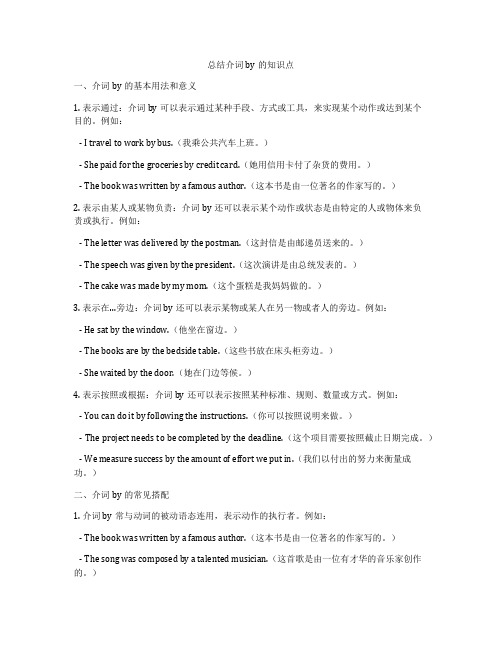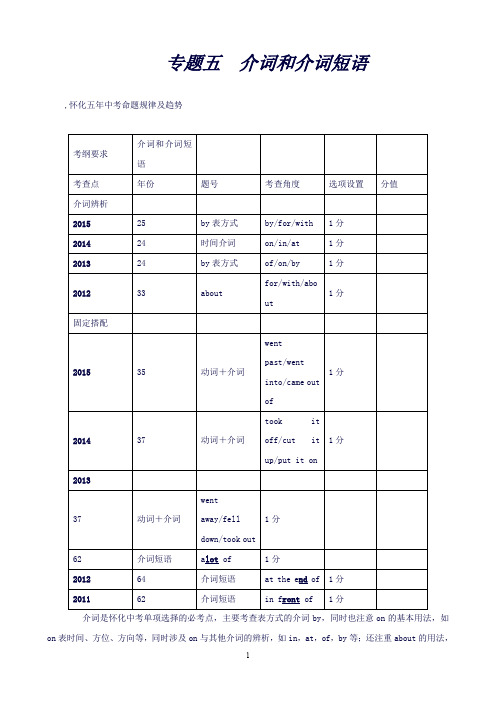End 的基本用法、习惯搭配脚踏两只船的翻译
总结介词by的知识点

总结介词by的知识点一、介词by的基本用法和意义1. 表示通过:介词by可以表示通过某种手段、方式或工具,来实现某个动作或达到某个目的。
例如:- I travel to work by bus.(我乘公共汽车上班。
)- She paid for the groceries by credit card.(她用信用卡付了杂货的费用。
)- The book was written by a famous author.(这本书是由一位著名的作家写的。
)2. 表示由某人或某物负责:介词by还可以表示某个动作或状态是由特定的人或物体来负责或执行。
例如:- The letter was delivered by the postman.(这封信是由邮递员送来的。
)- The speech was given by the president.(这次演讲是由总统发表的。
)- The cake was made by my mom.(这个蛋糕是我妈妈做的。
)3. 表示在…旁边:介词by还可以表示某物或某人在另一物或者人的旁边。
例如:- He sat by the window.(他坐在窗边。
)- The books are by the bedside table.(这些书放在床头柜旁边。
)- She waited by the door.(她在门边等候。
)4. 表示按照或根据:介词by还可以表示按照某种标准、规则、数量或方式。
例如:- You can do it by following the instructions.(你可以按照说明来做。
)- The project needs to be completed by the deadline.(这个项目需要按照截止日期完成。
)- We measure success by the amount of effort we put in.(我们以付出的努力来衡量成功。
高三英语(外研版)总复习语法课件:专项语法突破(4)冠词

必修2
专项语法突破(四)
高考英语总复习
方法二:掌握冠词的习惯用法、冠词活用和固定词组 中是否用冠词或用什么冠词。 You mustn't throw away the dictionary.I think someday it may come in handy. 这本字典你不能扔,我想不定什么时候它会派上用 场。 (come in handy是固定用法。)
外 研 版
必修2
专项语法突破(四)
高考英语总复习
单数可数名词 (2)turn+ a/an+形容词+名词
①He has turned doctor. 他已是一名医生了。 ②She has turned a successful singer. 她已是一名成功的歌手。
外 研 版
必修2
专项语法突破(四)
二、方法技巧总结 (一)冠词用法的总原则 名词前使用与不使用冠词,用定冠词还是不定冠词, 通常取决于下面三个基本因素: 1.名词是可数名词还是不可数名词。 2.名词是单数名词还是复数名词。 3.名词是表泛指还是特指。
外 研 版
必修2
专项语法突破(四)
高考英语总复习
(二)在平日复习过程中要注意冠词的一些特殊用法, 这也是考题中考查频率较高的部分 方法一:抽象名词一般不加冠词,但当抽象名词具体 化时,被具体化的抽象名词可能与a/an连用。 What he did is a great shame to all of us. 他的作为对我们来说是一个耻辱。(shame“羞耻”, 是不可数名词,此时与a连用表示“一件可耻的事”)。
必修2
专项语法突破(四)
高考英语总复习
(4)西洋乐器名词前 I like playing the guitar and my sister likes playing the piano. 我喜欢弹吉他而我姐姐喜欢弹钢琴。 (5)用于表示世纪、年代、时期或朝代的名词前 It was not rare in the 1990s that people in their fifties were applying for university. 20世纪90年代50多岁的人申请上大学并不罕见。
高中英语语法专题复习课件--冠词(共32张PPT)

5. Jane’s grandmother had wanted to write
______ children’s book for many years, but
(2) “go out for a(n)+名词”,表示从事某项活 动。 go out for a picnic去野餐
(3) 习惯搭配。 as a matter of fact; in a hurry; in a word; a waste of; in a way; come to an end; all of a sudden; have a(n)...knowledge of; have a(n)...understanding/grasp /feeling off
(6) 用在某些固定词组中:all of a sudden, as a matter of fact, go out for a walk, have a good time, make a difference, make a living, have an idea of, have a good knowledge of等。如: I don’t understand what the engineer means, but I’ve got a rough idea of the project plan.
out of question 不成问题 out of the question不可能
考点二 习语、固定短语中的冠词 1. 不定冠词用于短语搭配中。 (1) “have/take+a(n)+与动词同形的名词”,
end谚语 -回复

end谚语-回复1. "All's well that ends well." - 结果好,一切都好。
2. "The end justifies the means." - 目的证明手段正当。
3. "There's many a slip 'twixt the cup and the lip." - 谨慎始末,以防功亏一篑。
4. "All good things must come to an end." - 天下无不散之筵席。
5. "Ends and means must cohere." - 目的和手段必须一致。
6. "It is not over until it's over." - 不到最后关头,绝不放弃。
7. "A journey of a thousand miles begins with a single step, and ends with a single step." - 千里之行,始于足下,终于足下。
8. "The end of knowledge is wisdom." - 知识的终点是智慧。
9. "Do not count your chickens before they hatch, nor your gains until the deal is done." - 不要过早乐观,事情未结束前不算成功。
10. "As you sow, so shall you reap." - 种瓜得瓜,种豆得豆,因果报应终有结果。
11. "Every end is a new beginning." - 每个结束都是新的开始。
【ZKW】英语命题研究(怀化)中考英语语法专题突破:专题五介词和介词短语

专题五介词和介词短语,怀化五年中考命题规律及趋势介词是怀化中考单项选择的必考点,主要考查表方式的介词by,同时也注意on的基本用法,如on表时间、方位、方向等,同时涉及on与其他介词的辨析,如in,at,of,by等;还注重about的用法,设题形式多为简单句,以两个分句居多,词数为9~12。
另外,完形填空中也会涉及介词或介词短语的辨析,如动词+介词类的went into /took it off/ fell down。
此外在短文填词中,也涉及到了介词短语,如a lot of /in front of/ at the end of等。
预计2016年怀化中考的单项选择仍会与2015年保持一致,对介词考查不会有太大变化。
,怀化中考重难点突破介词【考点抢测】( )1.—Maybe you should call him up.—But I don't want to talk with him ______ the phone.A.on B.at C.in( )2.In America,people start celebrating the New Year ________ December 31st.A.in B.at C.on( )3.Lisa was born on May 1st,and my birthday is also ________ that month.A.over B.in C.on( )4.(2015娄底中考模拟)Most of my classmates go to school ______ bike.A.at B.by C.on( )5.________ the book,the teacher comes into the classroom.A.With B.At C.On( )6.Before the bridge was built ________ the river,the villagers had to take a boat to the other side.A.in B.besideC.across【满分点拨】一、时间介词的辨析和用法1.in,on,at口诀记忆年月周前要用in,具体日子却不行;遇到几号要用on,上午下午又用in;要说某日上下午,用on替换in才行;午夜黄昏和黎明,只用at不用in,at也在时分前。
from…to…的用法

from…to…的用法一般是from.to.,就是从.到.,from…to…的用法有哪些呢?本文是店铺整理from…to…的用法的资料,仅供参考。
from…to…的用法一、from…to…类结构的用法1. 主要意思(1) 表示“从……至……”“从……到……”.如:How far is it from your office to the bank? 从你办公室到银行有多远?We are removing from London to the country. 我们正从伦敦迁往乡下.I want a rope that will go from the top window to the ground. 我要一条绳,其长度能自最上一扇窗户垂到地面.(2) 表示“由……变成……”“将……改为……”.如:He has moved from acting to film production. 他由演员变成了制片人.She’s been downgr aded from principal to deputy. 她已从校长降为副校长.He swings from wild optimism to total despair. 他由极其乐观一变而为完全绝望.The room was converted from a kitchen to a lavatory. 这房间由厨房改成了厕所.(3) 表示“从一个……到另一个……”“一个……一个地”“逐个……”“挨个……”.如:These people go from house to house selling goods. 这些人挨家挨户兜售货物.The ape swung along from branch to branch. 那只猿猴从一根树枝汤到另一根树枝上.He went from village to village, seeking for work. 他从一个村子到另一个村子,找寻工作.I like to hop from channel to channel when I watch TV. 我看电视时喜欢不断地换频道.Migrant workers move from country to country in search of work. 流动工人从一国迁到另一国找寻工作.The smaller animals can easily leap from tree to tree. 身体较小的动物可以在树丛间轻巧地跳来跳去.Computer viruses replicate themselves and are passed along from user to user. 计算机病毒可以自我复制,然后由用户传给用户.2. 主要句法功能(1) 用作表语Lunch is from eleven to two. 从十一点到两点开午饭.Office hours are from 9 am to 5 pm. 办公时间从上午9点到下午5点.The price range is from $100 to $500. 价格在100美元至500美元之间不等.In Britain the long vacation is from June to October. 在英国,长的假期是从六月到十月.The annual range of temperature is from –10℃ to 40℃. 全年的温度较差为零下10度至40度.(2) 用作状语She went straight from school to university. 她中学一毕业就马上进了大学.Salaries are from 10% to 50% higher than in Britain. 薪金比在英国高10%到15%.The World Cup Final was beamed live from Britain to Japan. 世界杯决赛从英国向日本作了实况转播.I work from Tuesday to Saturday, and Sunday and Monday are my days off. 我从星期二到星期六工作,星期日和星期一休息.(3) 用作定语通常用于名词后作定语.如:The transition from boyhood to manhood can be a confusing period. 从少年时期向成年时期的转变常是令人困惑的时期.但有时from…to…结构用于名词前起修饰作用,此时通常可视为from…后(也就介词to之前)省略了一个名词.如:Norway jumped from ninth to third place. 挪威从第9位跃升至第3位.(可视为ninth的后面省略了place)Water passes from a liquid to a solid state when it freezes. 水结冰是由液态变为固态.(可视为liquid的后面省略了state) Could you cut your essay from 10,000 to 5,000 words? 请把你的那篇文章从10,000字删减到5,000字行吗?(可视为10,000的后面省略了words)3. 连用名词时是否用冠词当from…to…用于连接两个名词时,有时名词前需带有冠词,有时不用,情形比较复杂,大致遵循的原则如下:(1) 若所搭配的名词意思比较具体,是在谈论特定场合的具体人或事物,则通常要用冠词.如:The book fell from the table to the floor. 书从桌上掉到地板上.The scene cuts from the shop to the street. 镜头从商店转换到街道.A bus transported us from the airport to the city. 一辆公共汽车把我们从机场送到市区.(2) 若所搭配的名词意思比较抽象,只是在谈论一般概念或一般规律等,则不用冠词.比较:This skill wasn’t handed down from the father to the son. 这项技术并没有从父亲传给儿子.These skills used to be handed down from father to son. 这些技术以往都是父子相传.It is not far from the house he lived in to the house I lived in. 从他居住的房子到我居住的房子并不远.She went from house to house asking if anyone had seen the child. 她一家家去问是否有人见过这个小孩子.(3) 但有时用不用冠词,与说话人的侧重点有关.比较并体会:Then we transferredfrom a bus to a tram. 然后我们从公共汽车换成电车.This is where we change from car to bus. 这就是我们从小汽车换乘公共汽车的地方.(4) 在由from…to…构成的习语中,名词前通常是不用冠词的(见后面有关习语的用法归纳).如:He works from dawn till dusk. 他从天亮工作到天黑.From time to time I still think of her. 我仍然不时地想起她.He knows the subject from beginning to end. 这个专题他了如指掌.The children were covered in mud from head to toe. 孩子们全身沾满了污泥.She went from house to house asking if anyone had seen the child. 她一家家去问是否有人见过这个小孩子.但也有些习语,用不用冠词均可以,如from (the) cradle to (the) grave(一辈子,从生到死).如:From (the) cradle to (the) grave, the car marks every rite of American passage. 在美国人的一生中,每一个重要阶段都有汽车的影子.4. 关于与动名词的搭配from…to…结构除通常与名词、代词、数词等搭配外,有时还可与动名词搭配.如:He made a switch from publishing to teaching. 他由出版工作改做教学工作.We are trying to shift the emphasis from curing illness to preventing it. 我们正在努力把工作重点从治疗疾病转为预防疾病.He’s changed from being cynical about politics to beingvery interested in it. 他改变了对政治怀悲观的态度,而对其颇感兴趣.注意,以下句子中的from…to…结构中,to为不定式符号,用于构成不定式表示结果或目的等.如:She rose from her seat to protest. 她从座位上站起来提出抗议.He rose from the ranks to become an officer. 他由士兵升为军官.He dived from the bridge to rescue the drowning child. 他从桥上跳入水中去抢救那溺水儿童.People came from far and near to hear the famous violinist. 人们从四面八方赶来听这位著名小提琴家的演奏.5. 与动词vary, range等搭配from…to…还经常与range, vary等表示“变化”“变动”的动词搭配使用,表示变化或变动的范围.如:Dress sizes range from petite to extra large. 服装尺码从特小号到特大号不等.His interests ranged from chess to canoeing. 他的爱好从下国际象棋到划独木舟,范围很广.These fish vary in weight from 3 lb to 5 lb. 这些鱼的重量从3磅到5磅不等.The heights of the plants vary from 8 cm to 20 cm. 这些植物的高度从8厘米到20厘米不等.Her mood varied from optimism to extreme depression. 她的情绪由乐观一变而为极度消沉.值得一提的是,from…to…与动词vary搭配使用时,其中的from…to…还经常用于连接两个相同的名词,强调变化或差异.如:The weather varies from day to day. 天气一天天变化.Test scores vary from school to school. 测试成绩各校不同.Prices vary widely from shop to shop. 价格各个商店大不一样.The treatment will vary from patient to patient. 治疗方法因人而异.Levels of unemployment vary from region to region. 失业情形各地不同.Social customs vary greatly from country to country. 社会习俗各国差别很大.Medical treatment varies greatly from state to state. 医疗制度各州大不同一样.The symptoms she suffered varied from month to month. 她的症状每个月都不同.Office hours vary from company to company and country to country. 因公司、国家不同,办公时间也有所不同.【注】lurch from one crisis / extreme etc to another: also lurch from crisis to crisis比较以下相似表达:Salary scales vary between states. 工资高低各州不同.Salary scales vary from state to state. 工资高低一个州与另一州不同.Salary scales vary according to state. 工资高低视所在的州有报不同.Salary scales vary with each state. 工资高低各个州不同.6. 用于 fr om one…to…结构from one…to another主要用于谈论三者或三者以上的情况,大意为“从一个……到另一个……”,具体翻译时需视句子语境而定.如:She skipped from one subject to another. 她讲得没有条理,东拉西扯.She spends the day rushing from one meeting to another. 她成天在会场之间奔波.There are no mechanisms for transferring funds from one department to another. 基金无法从一部门转移至另一部门.【注】该结构有时也可用于指谈论两者的情况,如下面一句摘自《朗文当代高级英语辞典》第4版的shift词条:Joe listened, shifting uncomfortably from one foot to another. 乔听着,不安地把重心从一只脚转移到另一只脚.from one…to the other主要用于谈论两者的情况,意思是“从(两者中的)一个……到另一个……”.如:The two cultures were so utterly disparate that she found it hard to adapt from one to the other. 两种文化迥然不同,她发现很难用一种去适应另一种.from one…to the next与from one…to another用法相惟,也主要用于谈论三者或三者以上的情况,表示“从一个……到下一个……”,具体翻译时需视句子语境而定.如:His moods swung wildly from one day to the next. 他的情绪天天起伏很大.You don’t know what his mood will be from one day to the next. 真说不上他的情绪今天怎样明天又怎样.I couldn’t understand his lecture because he kept jumping from one topic to the next. 我听不懂他的演讲,他总是从一项内容跳到另一项内容.Statistical anomalies can make it difficult to compare economic data from one year to the next. 统计数字的不规则,会使某一年的经济资料很难与下一年相比较.7. 用于某些习惯搭配from beginning to end 从头到尾I’ve read the book from beginning to end. 我把这本书从头到尾看完了.The argument was shallow from beginning to end. 那次辩论从头到尾都很肤浅.from bad to worse 越来越糟Things are going from bad to worse. 事态越来越糟了.His business is going from bad to worse. •他的生意每况愈下.from cover to cover 从头至尾地"From...to"的用法“from…to…”是英语中极其常用的介词短语,表示“从…到…”,其用法很多,搭配能力也很强。
endupdoingsth是啥意思

endupdoingsth是啥意思
以做某事结束。
例句If you fool about with matches, you'll end up getting burned.如果你摆弄⽕柴,最后可能烧到⾃⼰。
endupdoingsth是啥意思
end up doing sth与end doing sth与finish doing sth的区别为:意思不同、⽤法不同、侧重点不同。
⼀、意思不同
1、end up doing sth:以做某事结束。
2、end doing sth:结束做某事。
3、finish doing sth:完成某事。
⼆、⽤法不同
1、end up doing sth:end的基本意思是“最后部分”“末尾”,引申可表⽰“端”“尽头”“梢”“终⽌”“死去”等。
2、end doing sth:end的基本意思是“结束”,通常指某⼀发展过程的最终结束。
end既可⽤作及物动词,也可⽤作不及物动词,在⽤作不及物动词时,常常与介词或副词构成短语。
3、finish doing sth:finish的基本意思是“结束,完成”,表明已达到所做事情的终点。
引申可表⽰“⽤光,吃光”“毕业”“杀掉”等。
三、侧重点不同
1、end up doing sth:侧重于表⽰以某事为重点,以这件事为终点。
2、end doing sth:侧重于表⽰以结束为重点,体现完结。
3、finish doing sth:侧重于表⽰把应该完成的事做完。
期中复习Unit2知识点讲义牛津译林英语八年级下册

8B Unit 202讲义1.end:n 末尾,结尾①at the end of ..在…末尾There is a bookshop ________________________________.在这条街的尽头有一家书店。
There will be a meeting ______________________________.这个月底将有一个会议。
②in the end 最后,最终(不加of,过去时)= at last = finallyThey won the game_________________________. 他们最终赢得了比赛。
③by the end of 到…末为止(完成时)The building will have been pleted ___________________________.到明年年底为止,这栋楼将完工。
v.end 结束=be overThe game ended. =The game was over. 游戏结束。
2. except 除了.....之外(不再有)besides除……之外(还有)今天除了Tom之外,大家都到了。
Everyone is here_________________Tom除了这枝外,我还有另一枝蓝色钢笔。
(1+1,共2枝)_________this pen, I have a blue one.我们都通过了考试,汤姆除外。
(整体中……汤姆一人不及格)We all passed the exam _________Tom.除了春天,我还喜欢秋天。
I like autumn _______________spring.3.deaddie v. 死(短动词)His grandpa died five years ago. 他的爷爷五年前去世。
dead adj. 死的Tom’s rabbit has been dead for a week. 汤姆的兔子死了一星期了。
- 1、下载文档前请自行甄别文档内容的完整性,平台不提供额外的编辑、内容补充、找答案等附加服务。
- 2、"仅部分预览"的文档,不可在线预览部分如存在完整性等问题,可反馈申请退款(可完整预览的文档不适用该条件!)。
- 3、如文档侵犯您的权益,请联系客服反馈,我们会尽快为您处理(人工客服工作时间:9:00-18:30)。
End 的基本用法、习惯搭配
脚踏两只船的翻译
play both ends against the middle
一、基本词义
1、 n: 末端, 尽头, 结束, 目标, 限度, 梢, 末端, 死亡;, 尖, 终点
边缘[界], 界限, 范围, 极限;端面, 端壁, 端头, 侧面;结束, 结尾, 结局, 最后情况
目的, 目标;死亡, 毁灭, 下场
N: [pl.]【纺】纱线, 经纱; 零布头; 残片; 残余
1.the end of a letter信的末尾
2.the ends of the world地球的两端,
天南海北, 天涯海角
3.by the end of the year到年底为止
4.demand an end to all unequal
treaties要求废除一切不平等条约
5.no good end for ...对...决无好下
场
6.That music is the end.那音乐妙极
了!
7.That last stupid bungle of his is
the end.他那最后一次愚蠢的错误使我
再也无法容忍了。
2、vi:结束, 终结, 终止;
vt. 结束, 终止, 消灭, 完结;以...结尾
1.end one's own life自杀
2.All my efforts ended in failure.
我的一切努力都归于失败。
二、End 的习惯搭配
1.achieve one's end达到目的
2.win one's end达到目的
3.gain one's end达到目的
4.all ends up[口]完全地, 彻底地
5.All is well that ends well.[谚]
结局好就一切都好。
6.at an end结束, 终止; 耗尽
7.at loose ends处于杂乱状态, 无所适从
8.at a loose end处于未定[未决]状态, 处于杂乱状态, 无所适从
9.at one's wits' end智穷才尽, 束手无策, 不知所措
10.at one's wit's end智穷才尽, 束手无策, 不知所措
11.at the end (of)在一端, 在终点
12.at the end of one's means财力枯竭, 山穷水尽
13.at the end of one's resources财力枯竭, 山穷水尽
14.at the end of one's rope智穷才尽, 处于绝境
15.at the end of one's tether精力衰竭, 智穷才尽, 财源枯竭
16.at the end of the day在一天的末了; 到了最后, 在结束的时候, 在结
帐的时候
17.at the end of the earth在天涯海角
18.be all on end大发脾气, 非常生气
19.be at a dead end到达铁道支线的终点; 无法前进, 停滞不前
e to a dead end到达铁道支线的终点; 无法前进, 停滞不前
21.reach a dead end到达铁道支线的终点; 无法前进, 停滞不前
22.be at an idle end (=be at loose ends)没有固定工作, 闲着, 无所事事23.be near one's end濒于死亡, 末日将至
24.be the end of是...致死的原因; 成为...毁灭的原因
25.begin at the wrong end开头就错, 做事不得法
26.start at the wrong end开头就错, 做事不得法
27.bring sb. to his wit's end使某人智穷计尽, 使某人不知所措, 使某人
陷入窘境
28.drive sb. to his wit's end使某人智穷计尽, 使某人不知所措, 使某人
陷入窘境
29.put sb. to his wit's end使某人智穷计尽, 使某人不知所措, 使某人陷
入窘境
30.bring to a dead end使...陷入僵局, 使...走投无路
31.bring to an end结束, 完成, 终止
32.bring to a close结束, 完成, 终止
33.by the end of到...末
34.carry sth. through to the end把某事进行到底
35.Choice of the end covers choice of the means只要目的正当, 可以不择手段。
e out at the little end of the horn[口]说了大话不能兑现
e out of the little end of the horn[口]说了大话不能兑现
e to the end结束, 告终
e to no good end失败, 没有好
下场
e to the end of one's rope智
穷才尽; 一筹莫展; 财源耗尽
41.run to the end of one's rope智穷才尽; 一筹莫展; 财源耗尽
e to the end of one's tether
智穷计尽, 财源枯竭, 山穷水尽
43.dead end死胡同, 不通的一头; 终点
44.draw to an end结束, 终结
45.from end to end从这一端到另一端;
46.get the wrong end of the stick[口]完全搞错了, 完全误解了
47.hold of the wrong end of the
stick[口]完全搞错了, 完全误解了48.get the better end of对...处于有利地位, 占...的上风
49.get the better end of the staff
占上风, 处于有利地位
50.get the right of the stick占上风, 处于有利地位
51.have the worse end of the staff 弄错, 误解
52.have an end告终, 完毕
53.take an end告终, 完毕
54.have no end of a time=have a good time玩得痛快, 过得极其愉快
55.have sth. at one's fingers' ends 熟练掌握某事, 精通某事
56.have sth. at one's tongue's end 把...背得滚瓜烂熟; 对...十分熟悉57.hold one's end up做好自己份内的事, 尽自己的责任;(在困难面前)坚持下去, 不泄气; keep
58.in the end最后, 终于
59.In the end things will mend.[谚]事到头, 总有救。
60.keep sb. at the stick's end疏远某人, 不与某人接近
61.knock the end in[俚]把整个事情搞得一团糟
62.live by one's finger's ends靠做手工过活
63.make an end of结束(某事); 停止(某事)
64.make both ends meet使收支相抵, 量入为出; 靠微薄收入为生
65.make two ends meet使收支相抵, 量入为出; 靠微薄收入为生
66.meet one's end死
67.play both ends against the middle 脚踏两只船;使两方相争坐收渔人之利
1.。
